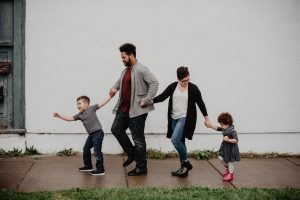
On March 13, 2020, the Oregon Court of Appeals emphasized that trial courts should consider whether family supports can mitigate the risk of harm to children, even when parents have deficits that would otherwise necessitate child welfare system involvement.
In Dept. of Human Services v. M. E., 302 Or App 571 (2020), the Court of Appeals reversed and remanded the trial court’s finding jurisdiction over four children due to mother’s alcohol problem and fathers’ admission that they required DHS assistance to make sure the children were safely parented. After an incident when mother hit one of her children while intoxicated, mother entered into a DHS-sanctioned protective action agreement. Under the plan, the children were going to live with their great-aunt and mother would only have supervised contact. Mother and great-aunt complied with the plan.
Five days later, DHS removed the children from great-aunt because of a singular 20-year old allegation relating to the great-aunt’s husband.
At the jurisdictional hearing two months later, mother argued there was no need for court involvement because the children could be safely cared for by the great-aunt until the mother, who had entered residential drug and alcohol treatment, could resume care of the children. The court didn’t consider mother’s argument, saying that it was too little too late—once DHS removed the children, the court couldn’t consider whether the children would be safe with the great-aunt. However, the court did express hope that DHS could place the children with the great-aunt.
The Court of Appeals disagreed, holding “[t]hat a parent did not establish the third-party caregiving arrangement before DHS involvement does not preclude a juvenile court from taking that arrangement into account in assessing whether a child faces the type of current risk of injury or harm that allows for dependency jurisdiction.”
This case continues the line of “family plan” cases that began in 2015 with Dept. of Human Services v. A. B., 271 Or App 354 (2015) and Dept. of Human Services v. A. L., 268 Or App 391 (2015). In both A.B. and A.L., the Court of Appeals considered cases where, although parents’ behavior presented a risk of harm that would justify dependency jurisdiction, extended family members were safely caring for the children at the time of DHS involvement and therefore jurisdiction was unnecessary. In essence, the involvement of family members mitigated the risk caused by parental deficits. In Dept. of Human Services v. T. L., 279 Or App 673 (2016), the Court of Appeals determined that evidence that another person is able to assist in caring for a child in a way that mitigates the risk posed by a parent is relevant to whether or not there is a need for continued court jurisdiction. In Dept. of Human Services v. J. G. K., 298 Or App 398 (2019), the Court of Appeals held that whenever a court is considering jurisdiction, parenting assistance provided by family or friends is relevant to determining whether the child is safe.
The family plan cases illustrate two key points. First, parents need not parent alone. When a parent has deficits, that if unmitigated, would place a child at risk of harm, it is absolutely reasonable to create a protective family plan, relying on safe friends and family to provide parenting assistance. Second, the focus of the juvenile court must be on child safety. As long as the family plan sufficiently counters the risk to the child, there is no basis for dependency jurisdiction.
If the involvement of friends and family members sufficiently counters the risk to a child otherwise presented by a parent’s deficits so that the child is safe, dependency jurisdiction is not warranted.